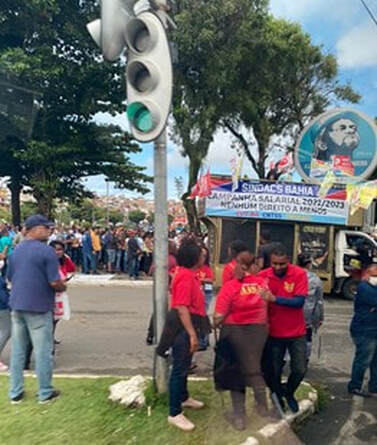|
By Ellie Schmaltz and Clair Moonen Two blondes, often mistaken for either sisters or the French, have been experiencing Brazil for a little over a week now. While our stay has been short, the lessons and experiences will last a lifetime. We are beginning to understand the importance of global intersectionality and will continue our studies for another two weeks. The topics we’ve faced have almost been as heavy as the plates our mom makes us for dinner. In Clair’s subtopic gender and elections, we researched the impact of quotas, campaign funding, etc. On the first day in Brazil, we drove past a man on a bus shouting in a megaphone to a crowd. He was running for governor, and I observed only men officials helping with his campaign event. The only women were in the crowd and even then, men outnumbered women. Billboards adorned only male political campaigns, and I only saw one female campaign poster- next to a favela.  Pictured is the political campaign illustrating 2021 findings that, party elites provide female candidates less advantageous candidate identification numbers, less financial support, and less media coverage than male candidates disadvantaging women in politics. Campaign support is power (Jasusz et al. 2021). This is something that I, Ellie, read about in my subtopic. I read, “Violence against women denies women’s condition as equal subjects and contributes to keeping them subaltern in public life; political violence against women denies women’s condition as equal political actors and contributes to keeping them subaltern in politics, weakening and limiting democracy” (Biroli 2016, 2). In regards to gender, we have seen the implementation of strong gender roles within our household. Our mom is a retired public servant that now hosts American students for Clara Hamos as well as a medical student from rural Brazil. On her “get to know me” form, she listed housework as her hobby. Cooking is especially her favorite. We’ve noticed a trend of mostly women working in the restaurants we’ve been to. There are typically male bartenders, and the people cutting the meat at the tables of the steakhouse were males, as well. Other than that, we typically saw women doing the cooking in the restaurants. We rarely see women walking alone. Even the women that work at the fruit and magazine stands on our walk to ICR are never by themselves. Our mom also briefly explained her divorce with her husband. The reasoning she provided behind the split was the word “controlling''. This can be used in many different contexts, but it reminded me of an article we read in class. In reference to violence against women, it said “The study also reveals the dominance of men over their partner, who must be controlled and monitored daily, considered as natural behavior violating the right to come and go, freedom to express themselves and relate to others, especially with their friends. The female behavior considered inappropriate by the spouses also incites conjugal violence” (Silva 2020, 5). While I am not trying to imply our mom faced any sort of violence from him, the language usage prompted me to reflect on Silva’s article. Domestic violence is typically hidden well, so you can never be sure who we’ve all met or walked past that has faced the issues Silva speaks of. Brazil seems to have the same high domestic violence rates that our Central Minnesota community has as well. After hearing the word ‘negro’ thrown around so casually a few days in, the racial culture differences started to become more prominent. Our tour guide had mentioned on day two that us Americans have an idea about race as something you try not to speak about, but in Brazil they are trying to teach people that ‘Black is beautiful’. The example he gave was embracing natural hair and features. We see this paralleled in America with social media campaigns especially in the makeup and beauty world embracing African American hair and brands having inclusive color shades. Reflecting the concept that silence is violence and only oppresses people of color further. What Fred said made us think of why this has only recently been a movement. Pre-departure analysis of Becoming Brazilians touched on the erasure of race in Brazil. “When the Brazilian military removed the ‘color question’ from the 1970 census and then attempted to keep it out of the 1980 census, social scientists protested loudly” (Eakin 2017, p 240). In the same book, Brazilian historian and sociologist Gilberto Freyre argued that in a census the color question wasn’t necessary because Brazillians are beyond racial origins and a singular meta-race. This is interesting because in the United States the government and people made segregation the national identity and culture, not neglection of race.“Black activists argue that the decades of efforts to forge a single, national ‘ethnicity’ a la Freyre has suppressed alternative identities and ethnicities in a form of cultural erasure” (Eakin 2017, p 240). Something as passive as filling in a bubble has the power to diminish people’s identities. The same negligence of cultural presence in data and recognition we’ve noticed lacks in religion as well. Professor Willys Santos said that religious statistics were inaccurate because in 2020 the current office didn’t conduct a census. Whatever the political motivation, ethically this limits and harms scientists and research without a correct disclosure of data. This absence of precise information has been a common theme in our lectures and workshops, highlighting the need of accurate data and transparency of a government. Biroli, Flávia. “Political Violence against Women in Brazil: Expressions and Definitions / Violência Política Contra as Mulheres No Brasil: Manifestações E Definições.” Revista Direito e Práxis 7, no. 15 (2016). Eakin, Marshall C. 2017. “The Sounds of Cultural Citizenship.” Chapter. In Becoming Brazilians: Race and National Identity in Twentieth-Century Brazil, 200–219. New Approaches to the Americas. Cambridge: Cambridge University Press. doi:10.1017/9781316800058.008. Janusz, Andrew, Sofi-Nicole Barreiro, and Erika Cintron. “Political Parties and Campaign Resource Allocation: Gender Gaps in Brazilian Elections.” Political Party, April 18, 2021. https://doi.org/10.1177/13540688211018424. Silva, Andrey Ferreira da, Nadirline Pereira Gomes, Júlia Renata Fernandes de Magalhães, Fernanda Matheus Estrela, Anderson Reis de Sousa, Jordana Brock Carneiro. 2020. “Social Attributes of the Male That Suscept the Violence by Intimate Partner.” Rev Bras Enferm 73, no. 6 (Summer): 1-7.  Eliana (Ellie) Schmaltz is a rising junior at the College of Saint Benedict. She is pursuing a degree in political science and sociology in the hopes to attend law school after graduation. After law school, she would like to be a family lawyer and give back to the community that raised her. Ellie is originally from a small town called Eden Valley located in Central Minnesota. She looks forward to learning more about Brazilian culture and experiencing everything the scenic country has to offer while studying abroad in Salvador.  Clair Moonen is a rising Junior at the College of Saint Benedict Saint Johns University. Majoring in Political Science on the Pre-Law track with a minor in communications. She is from Delano, Minnesota. Clair is women’s empowerment chair of the service sorority, Academic Affairs Representative on the student Senate and enjoys being involved on campus regarding student relations. When not studying in Alcuin Library, she is the goalie on the lacrosse team. She looks forward to experiencing another culture and political system while abroad in Brazil.
0 Comments
Leave a Reply. |
Archives
June 2024
Categories
All
|

 RSS Feed
RSS Feed
